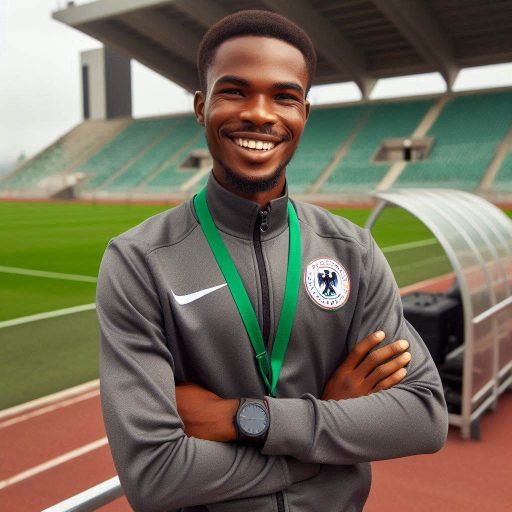Introduction
Let’s explore navigating contracts: Sports agent guide in Nigeria.
Navigating contracts for sports agents in Nigeria is a critical aspect of their profession.
Understanding contracts is a crucial guide for sports agent as it affects their clients’ careers and earnings.
In the dynamic realm of sports management, the role of agents stands as a pivotal guide, bridging the aspirations of athletes with the intricate web of contracts and negotiations.
Within the vibrant sporting landscape of Nigeria, this function takes on a distinctive hue, where unique challenges and opportunities converge.
This guide seeks to illuminate the path for sports agent, offering a comprehensive compass through the labyrinth of contracts in the Nigerian context.
This blog post will discuss the importance of contract negotiation, key clauses to consider, and legal considerations to sports agent in Nigeria.
By delving into the nuances of legal frameworks, cultural considerations, and industry-specific practices, we aim to empower agents with the knowledge and strategies essential for successful navigation in this dynamic arena.
From understanding the legal intricacies to fostering fruitful relationships, this guide is tailored to equip sports agents with the tools they need to thrive in the Nigerian sports management ecosystem.
So, let us embark on this journey, as we unravel the intricacies of navigating contracts in the vibrant world of Nigerian sports.
Importance of Legal Knowledge for Sports Agents in Nigeria
Role of Sports Agents in Nigeria in Representing Athletes
- Sports agents in Nigeria serve as intermediaries between athletes and clubs, negotiating contracts and representing their clients.
- They help athletes secure lucrative deals, navigate legal issues, and protect their interests in the sports industry.
- Agents take responsibility for building relationships with clubs, sponsors, and other key stakeholders on behalf of the athletes.
The Vital Role of Contracts in Ensuring Fair and Ethical Representation
- Contracts are essential legal documents that outline the terms and conditions of the relationship between athletes and clubs.
- They stipulate the duration, financial obligations, performance expectations, and dispute resolution procedures.
- Properly drafted contracts ensure that athletes receive fair compensation, have access to appropriate training facilities, and are protected from exploitation.
- Contracts also establish the rights and responsibilities of both parties, fostering a transparent and equitable working relationship.
Potential Consequences of Inadequate Legal Knowledge for Sports Agents
- Without adequate legal knowledge, sports agents in Nigeria may fail to protect their clients’ interests.
- Inaccurate or poorly negotiated contracts may lead to financial losses, unfair treatment, and limited career opportunities for athletes.
- Failure to comply with legal requirements can result in legal disputes, reputation damage, and potential penalties.
- Lack of understanding of contract clauses, negotiations, and legal nuances can weaken the positions of athletes during discussions.
- Agents with insufficient legal knowledge may be more susceptible to fraudulent activities, impacting their credibility and jeopardizing their clients’ careers.
It is imperative for sports agents in Nigeria to possess a strong legal foundation to effectively represent their athletes.
By understanding the intricacies of contract law, agents can advocate for fair terms, protect their clients’ rights, and create mutually beneficial partnerships.
Legal knowledge enables agents to navigate the complexities of the sports industry, ensuring compliance with regulations and minimizing risks.
Ultimately, the role of sports agents goes beyond securing lucrative deals; they act as advocates, advisors, and advocates for ethical and fair representation.
Therefore, investing in legal education and continuously updating legal expertise is crucial for sports agents in Nigeria.
It equips them with the necessary skills and knowledge to excel in a highly competitive industry while safeguarding the interests of athletes.
Read: Ethics in Sports Management: Focus on Agents in Nigeria
Overview of Contract Law in Nigeria
A contract is a legally binding agreement between two or more parties that creates certain obligations.
In Nigeria, contracts are governed by the legal framework provided by the Nigerian Contract Act.
Legal Framework Governing Contracts in Nigeria
The Nigerian Contract Act, which is based on the English Common Law, is the primary legislation governing contracts in Nigeria.
It provides rules and regulations for the formation, performance, and enforcement of contracts in the country.
Under the Nigerian Contract Act, parties are free to enter into contracts as long as they have the legal capacity to do so.
The Act recognizes different types of contracts, including written, oral, and implied contracts.
The Act also outlines the essential elements that must be present for a contract to be valid.
These elements include:
- Offer and Acceptance: There must be a clear offer made by one party and an acceptance of that offer by the other party.
- Intention to Create Legal Relations: The parties must intend for their agreement to create legal rights and obligations.
- Consideration: There must be valuable consideration exchanged between the parties, which can be in the form of money, goods, or services.
- Legal Capacity: The parties involved must have the legal capacity to enter into a contract. This means they must be of sound mind and of legal age.
- Consent: The parties must give their free and genuine consent to the terms of the contract without any duress, fraud, or mistake.
- Legality: The purpose of the contract must be lawful and not against public policy or prohibited by any law.
Laws and Regulations Regarding Sports Contracts
In addition to the Nigerian Contract Act, there are other laws and regulations that specifically apply to sports contracts in Nigeria. These include:
- Nigeria Football Federation (NFF) Regulations: The NFF has regulations that govern the negotiation, drafting, and enforcement of contracts for football players and coaches in Nigeria.
- National Sports Commission Act: This Act establishes the National Sports Commission, which has the authority to regulate and oversee sports contracts in Nigeria.
- Ad-hoc Committees and Sports Associations Regulations: Various sports associations and ad-hoc committees may have their own regulations that apply to contracts within their respective sports.
These laws and regulations provide additional guidelines and protections for parties involved in sports contracts in Nigeria, ensuring fairness and proper management within the sports industry.
Key Principles and Elements of a Valid Contract in Nigeria
For a contract to be valid in Nigeria, it must fulfill the following key principles and elements:
- Offer and Acceptance: There must be a clear offer that is accepted by the other party without any conditions or modifications.
- Intention to Create Legal Relations: The parties must have a genuine intention to be legally bound by the terms of the contract.
- Consideration: There must be a valuable exchange or benefit given by one party in return for the promise or performance of the other party.
- Legal Capacity: Both parties must have the legal capacity to enter into a contract, including being of sound mind and of legal age.
- Consent: The parties must freely and willingly agree to the terms of the contract, with no duress, fraud, or mistake.
- Legality of Purpose: The purpose of the contract must be legal and not against public policy or prohibited by law.
These principles and elements ensure that contracts in Nigeria are fair, enforceable, and provide legal protection to the parties involved.
In fact, understanding the overview of contract law in Nigeria is crucial for sports agents operating in the country.
The Nigerian Contract Act, along with specific laws and regulations for sports contracts, provide the necessary legal framework and guidelines for the formation and enforcement of valid contracts.
By adhering to these principles, sports agents can navigate contracts effectively and protect the interests of their clients.
Read Marketing Yourself as a Sports Agent in Nigeria: Strategies
Essential Clauses and Considerations in Sports Contracts
Importance of clear and detailed contract clauses for both parties involved
- Clear and detailed contract clauses ensure that both parties fully understand their rights and obligations.
- These clauses provide a framework for resolving disputes and preventing misunderstandings.
- By including specific language, both parties can protect their interests and avoid potential conflicts.
- Well-drafted clauses help maintain the integrity and enforceability of the contract.
- Having transparent clauses promotes a healthy working relationship and fosters trust between the parties.
Key clauses commonly found in sports contracts
- Payment Terms: Clearly outline the payment schedule, amounts, and any additional compensation.
- Duration: Specify the length of the contract, including any renewal or termination options.
- Termination: State the conditions under which either party can terminate the contract.
- Performance Expectations: Define the athlete’s responsibilities, including training, competitions, and behavior expectations.
- Injury Protocols: Address the responsibilities and compensation in case of athlete injury.
- Confidentiality and Non-Disclosure: Protect sensitive information shared during the contract period.
- Image and Likeness Rights: Specify the usage and compensation for the athlete’s image and likeness.
- Dispute Resolution: Outline the process for resolving any disputes that may arise.
Specific considerations for sports agents when negotiating contracts on behalf of athletes
- Finding the Right Fit: Agents must understand their athlete’s goals, values, and priorities before negotiating.
- Research and Preparation: Agents need to thoroughly study the contract terms and the athlete’s market value.
- Negotiating Remuneration: Agents should aim for fair and competitive compensation packages for their athletes.
- Inclusion of Performance Bonuses: Agents can add performance-based bonuses to incentivize athletes for exceptional achievements.
- Safeguarding Future Opportunities: Agents should make sure the contract does not restrict the athlete’s future career options.
- Protecting against Unfair Terms: Agents must identify any unfavorable clauses and negotiate in favor of the athlete.
- Understanding Jurisdictional Laws: Agents should have a clear understanding of local laws and regulations governing sports contracts.
- Seeking Legal Expertise: Agents may consult with sports lawyers to ensure the legality and fairness of the contract.
- Building Strong Relationships: Agents should strive to maintain good relationships with teams, sponsors, and other stakeholders.
- Continuous Monitoring: Agents must oversee contract compliance and advocate for their athlete’s best interests throughout the agreement.
By including comprehensive and concise clauses, both parties can navigate sports contracts in Nigeria with clarity and confidence.
Read: Education Path for Sports Agents in Nigeria: A Roadmap

Negotiating and Drafting Contracts as a Sports Agent
Tips and Strategies for Effective Contract Negotiation
- Prepare thoroughly by researching the athlete’s market value and comparable contracts.
- Identify the athlete’s priorities and goals and align them with contract terms.
- Establish open lines of communication with the athlete and their representatives.
- Be patient but assertive during negotiations, focusing on win-win outcomes.
- Anticipate potential obstacles and develop contingency plans to address them.
- Consider the long-term implications of contract terms, including performance-based incentives and termination clauses.
- Consult legal experts or experienced sports agents for guidance in complex negotiations.
- Document all agreed-upon terms in writing to avoid misunderstandings.
- Keep the athlete’s personal and professional interests at the forefront throughout the negotiation process.
- Maintain professionalism and integrity, fostering trust and building strong relationships with stakeholders.
The Role of Sports Agents in Drafting Contract Proposals
Sports agents play a crucial role in representing athletes during the contract drafting phase.
- Gather all necessary information, including the athlete’s career goals, financial objectives, and legal considerations.
- Collaborate with legal experts to ensure compliance with relevant sports laws and industry regulations.
- Draft clear and concise contract proposals that reflect the athlete’s interests and protect their rights.
- Negotiate contract terms with the athlete’s best interests in mind, aiming for favorable conditions.
- Facilitate communication between the athlete, their legal team, and potential employers or sponsors.
- Address potential conflicts or disputes by including appropriate resolution mechanisms in the contract.
- Advise the athlete on the implications of specific contractual provisions and obligations.
- Ensure contract language is comprehensive, leaving no room for misinterpretation or exploitation.
- Strive for contracts that provide flexibility to accommodate changing circumstances in the athlete’s career.
- Continuously review and update contract terms to reflect evolving industry standards and the athlete’s goals.
Ensuring the Best Interests of the Athlete in the Contract
Representing the best interests of the athlete is paramount during contract negotiations.
- Carry out thorough due diligence on potential employers or sponsors to assess their reputation and financial stability.
- Ensure that the compensation structure aligns with the athlete’s market value and future earning potential.
- Negotiate favorable terms for endorsements, appearance fees, and intellectual property rights.
- Include performance-based incentives that motivate the athlete and reward exceptional achievements.
- Safeguard the athlete’s image, privacy, and personal brand by including appropriate clauses in the contract.
- Secure adequate insurance coverage for the athlete’s health, career-ending injuries, or unforeseen circumstances.
- Address confidentiality agreements to protect sensitive information and maintain the athlete’s privacy.
- Consider the athlete’s long-term career goals and advocate for provisions supporting their development and growth.
- Seek input and collaboration from other professionals, such as financial advisors and legal experts.
- Regularly review contracts to ensure ongoing alignment with the athlete’s changing goals and market conditions.
In summary, effective contract negotiation requires thorough preparation, communication, and an understanding of the athlete’s priorities.
Sports agents play a pivotal role in drafting contract proposals that protect the athlete’s interests while fostering stability and growth throughout their career.
By prioritizing the athlete’s best interests and employing strategic negotiation techniques, sports agents can secure favorable contracts that support the athlete’s long-term goals and success.
Read: How to Build Client Relationships as a Sports Agent in Nigeria
Ensuring Compliance and Dispute Resolution
Importance of Enforcing Contract Terms and Ensuring Compliance
- Upholding contract terms is crucial for maintaining fairness and integrity in sports agreements.
- It ensures that all parties involved honor their responsibilities and fulfill their obligations.
- Enforcing contract terms prevents misunderstandings, disputes, and potential legal consequences.
- Compliance with contract terms promotes trust and credibility between sports agents and their clients.
- It also helps in maintaining a professional reputation and attracting new athletes for representation.
Options Available for Dispute Resolution in Sports Contracts in Nigeria
- Mediation: A voluntary process where a neutral third party helps the parties involved to negotiate and reach a settlement.
- Arbitration: Parties submit their dispute to an impartial arbitrator, who listens to both sides and makes a binding decision.
- Litigation: A formal legal process where disputes are resolved in a court of law based on applicable laws and regulations.
- Alternative Dispute Resolution (ADR): Any method used instead of litigation for settling disputes, such as negotiation or conciliation.
Guidance on How Sports Agents Can Handle Contract Breaches or Disputes
- Be Proactive: Ensure that all contract terms are clear, comprehensive, and well-documented from the beginning.
- Communicate Effectively: Maintain open and transparent communication with clients to prevent misunderstandings.
- Prenegotiate Dispute Resolution: Include a clause in the contract that specifies the preferred method of dispute resolution.
- Seek Legal Advice: Consult with a sports lawyer who specializes in contract law and sports dispute resolution.
- Attempt Amicable Resolution: Prioritize resolving the dispute amicably through negotiation or mediation before considering legal action.
- Understand Regulations: Familiarize yourself with the governing body’s rules and regulations specific to sports contracts in Nigeria.
- Preserve Evidence: Collect and preserve any evidence related to the contract breach or dispute in case legal action becomes necessary.
- Evaluate Legal Options: Assess the potential risks, costs, and benefits of pursuing litigation or arbitration before making a decision.
- Consider Relations: Consider the long-term relationship with the athlete and the potential impact of pursuing legal action on future collaborations.
- Maintain Professionalism: Throughout the dispute resolution process, it is essential to act professionally and ethically.
In brief, enforcing contract terms and ensuring compliance are vital for sports agents in Nigeria.
By understanding the options available for dispute resolution and following proper guidance in handling breaches or disputes, sports agents can protect their clients’ interests and maintain a successful career in contract negotiation and management.
Gain More Insights: Networking Tips for Nigerian Strength Coaches
Explore Further: The Ethical Side of Sports Nutrition in Nigeria
See Related Content: The Future of Sports Agency in Nigeria: Trends and Forecasts
Conclusion
In this blog section, we explored the essential aspects of navigating contracts as a sports agent in Nigeria.
We discussed the importance of understanding contract terms, negotiating effectively, and ensuring legal compliance.
Navigating contracts is crucial for sports agents in Nigeria to protect their clients’ interests and maximize their earning potential.
By carefully examining contract terms and negotiating favorable agreements, agents can ensure fair compensation and protect their clients from potential exploitation.
It is also essential to stay updated on the legal requirements and regulations surrounding sports contracts in Nigeria.
By understanding the legal landscape, agents can avoid legal disputes and ensure compliance, maintaining their reputation in the industry.
Furthermore, the ability to navigate contracts effectively enhances an agent’s credibility and trustworthiness among players, clubs, and other stakeholders.
Building strong relationships and ensuring fair deals can lead to long-term success and lucrative opportunities in the sports agency business.
In a nutshell, mastering the art of navigating contracts is essential for sports agents operating in Nigeria.
By understanding the main points discussed in this blog section and implementing them in practice, agents can empower themselves and their clients, ultimately thriving in the competitive world of sports representation.




